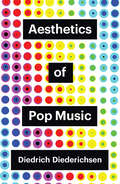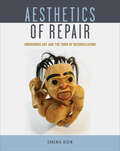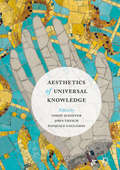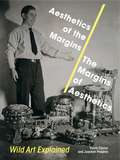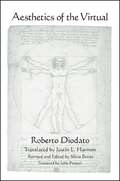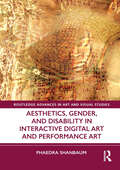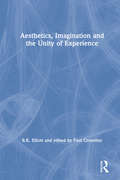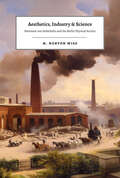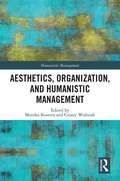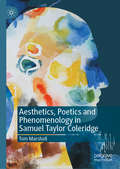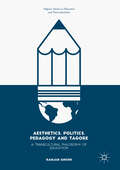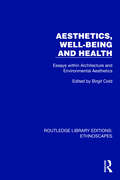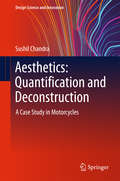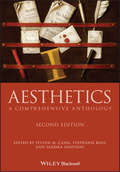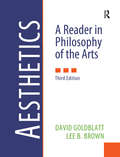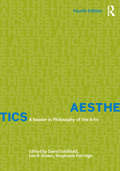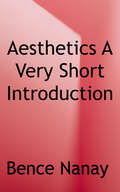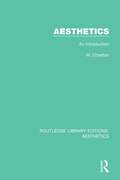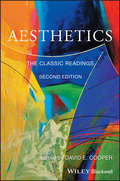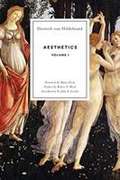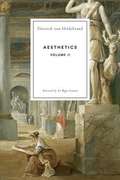- Table View
- List View
Aesthetics of Pop Music (Theory Redux)
by Diedrich DiederichsenIn this short book, the leading German cultural critic Diedrich Diederichsen puts forward a fresh and original account of pop music. He argues that pop music is not so much a form of music as a constellation of different media channels, social spaces and behavioural systems, of which music is only a part. Its own logic of attraction is based less on compositions and the expression of subjectivity and more on indexicality, real or pseudo-involuntary effects as recorded by sound technologies, and on studio discipline and staging, and hence on performance. By elaborating his innovative account of pop music as a constellation, Diederichsen develops a theory that distinguishes itself from sociology, cultural studies, media studies and ethnography, while at the same time drawing on and encompassing them all.
Aesthetics of Repair: Indigenous Art and the Form of Reconciliation
by Eugenia KisinAesthetics of Repair analyses how the belongings called “art” are mobilized by Indigenous artists and cultural activists in British Columbia, Canada. Drawing on contemporary imaginaries of repair, the book asks how diverse forms of collective reckoning with settler-colonial harm resonate with urgent conversations about aesthetics of care in art. The discussion moves across urban and remote spaces of display for Northwest Coast–style Indigenous art, including galleries and museums, pipeline protests, digital exhibitions, an Indigenous-run art school, and a totem pole repatriation site. The book focuses on the practices around art and artworks as forms of critical Indigenous philosophy, arguing that art’s efficacies in this moment draw on Indigenous protocols for enacting justice between persons, things, and territories. Featuring examples of belongings that embody these social relations – a bentwood box made to house material memories, a totem pole whose return replenishes fish stocks, and a copper broken on the steps of the federal capital – each chapter shows how art is made to matter. Ultimately, Aesthetics of Repair illuminates the collision of contemporary art with extractive economies and contested practices of “resetting” settler-Indigenous relations.
Aesthetics of Sorrow: The Wailing Culture of Yemenite Jewish Women
by Tova GamlielThe term "wailing culture" includes an array of women's behaviors and beliefs following the death of a member of their ethnic group and is typical of Jewish life in Yemeni culture. Central to the practice is wailing itself--a special artistic genre that combines speech with sobbing into moving lyrical poetry that explores the meaning of death and loss. In Aesthetics of Sorrow: The Wailing Culture of Yemenite Jewish Women, Tova Gamliel decodes the cultural and psychological meanings of this practice in an ethnography based on her anthropological research among Yemenite Jewish communities in Israel in 2001-2003. Based on participant-observervation in homes of the bereaved and on twenty-four in-depth interviews with wailing women and men, Gamliel illuminates wailing culture level by level: by the circles in which the activity takes place; the special areas of endeavor that belong to women; and the broad social, historical, and religious context that surrounds these inner circles. She discusses the main themes that define the wailing culture (including the historical origins of women's wailing generally and of Yemenite Jewish wailing in particular), the traits of wailing as an artistic genre, and the wailer as a symbolic type. She also explores the role of wailing in death rituals, as a therapeutic expertise endowed with unique affective mechanisms, as an erotic performance, as a livelihood, and as an indicator of the Jewish exile. In the end, she considers wailing at the intersection of tradition and modernity and examines the study of wailing as a genuine methodological challenge. Gamliel brings a sensitive eye to the vanishing practice of wailing, which has been largely unexamined by scholars and may be unfamiliar to many outside of the Middle East. Her interdisciplinary perspective and her focus on a uniquely female immigrant cultural practice will make this study fascinating reading for scholars of anthropology, gender, folklore, psychology, performance, philosophy, and sociology.
Aesthetics of Universal Knowledge
by Simon Schaffer John Tresch Pasquale GagliardiThis volume presents innovative and provocative arguments about the claims of universal knowledge schemes and the different aesthetic and material forms in which such claims have been made and executed. Contributors take a close look at everything from religious pilgrimages, museums, and maps of the world, to search engines and automated GPS. This collection of essays and debates is the result of a major international dialogue held at the Fondazione Giorgio Cini in Venice, Italy. Current obsessions in information technology, communications theory, and digital culture often concern the value and possibility of a grand accumulation of universally accessible forms of knowledge: total libraries, open data bases, ubiquitous computing, and 'smart' technologies. These obsessions have important social and philosophical origins, and they raise profound questions about the very nature of knowledge and its organization. This volume's contributors draw on the histories of maps and of encyclopedias, worldviews and visionary collections, to make sense of the crucial relation between the way the world is known and how it might be displayed and transformed.
Aesthetics of the Margins / The Margins of Aesthetics: Wild Art Explained
by David Carrier Joachim Pissarro"Wild Art" refers to work that exists outside the established, rarified world of art galleries and cultural channels. It encompasses uncatalogued, uncommodified art not often recognized as such, from graffiti to performance, self-adornment, and beyond. Picking up from their breakthrough book on the subject, Wild Art, David Carrier and Joachim Pissarro here delve into the ideas driving these forms of art, inquire how it came to be marginalized, and advocate for a definition of "taste," one in which each expression is acknowledged as being different while deserving equal merit.Arguing that both the "art world" and "wild art" have the same capacity to produce aesthetic joy, Carrier and Pissarro contend that watching skateboarders perform Christ Air, for example, produces the same sublime experience in one audience that another enjoys while taking in a ballet; therefore, both mediums deserve careful reconsideration. In making their case, the two provide a history of the institutionalization of "taste" in Western thought, point to missed opportunities for its democratization in the past, and demonstrate how the recognition and acceptance of "wild art" in the present will radically transform our understanding of contemporary visual art in the future.Provocative and optimistic, Aesthetics of the Margins / The Margins of Aesthetics rejects the concept of "kitsch" and the high/low art binary, ultimately challenging the art world to become a larger and more inclusive place.
Aesthetics of the Margins / The Margins of Aesthetics: Wild Art Explained
by David Carrier Joachim Pissarro“Wild Art” refers to work that exists outside the established, rarified world of art galleries and cultural channels. It encompasses uncatalogued, uncommodified art not often recognized as such, from graffiti to performance, self-adornment, and beyond. Picking up from their breakthrough book on the subject, Wild Art, David Carrier and Joachim Pissarro here delve into the ideas driving these forms of art, inquire how it came to be marginalized, and advocate for a definition of “taste,” one in which each expression is acknowledged as being different while deserving equal merit.Arguing that both the “art world” and “wild art” have the same capacity to produce aesthetic joy, Carrier and Pissarro contend that watching skateboarders perform Christ Air, for example, produces the same sublime experience in one audience that another enjoys while taking in a ballet; therefore, both mediums deserve careful reconsideration. In making their case, the two provide a history of the institutionalization of “taste” in Western thought, point to missed opportunities for its democratization in the past, and demonstrate how the recognition and acceptance of “wild art” in the present will radically transform our understanding of contemporary visual art in the future.Provocative and optimistic, Aesthetics of the Margins / The Margins of Aesthetics rejects the concept of “kitsch” and the high/low art binary, ultimately challenging the art world to become a larger and more inclusive place.
Aesthetics of the Virtual (SUNY series in Contemporary Italian Philosophy)
by Roberto DiodatoArguing that the virtual body is something new—namely, an entity that from an ontological perspective has only recently entered the world—Roberto Diodato considers the implications of this kind of body for aesthetics. Virtual bodies insert themselves into the space opened up by the famous distinction in Aristotle's Physics between natural and artificial beings—they are both. They are beings that are simultaneously events; they are images that are at once internal and external; they are ontological hybrids that exist only in the interaction between logical-computational text and human bodies endowed with technological prostheses. Pursuing this line of thought, Diodato reconfigures classic aesthetic concepts such as mimesis, representation, the relation between illusion and reality, the nature of images and imagination, and the theory of sensory knowledge.
Aesthetics, Gender, and Disability in Interactive Digital Art and Performance Art (Routledge Advances in Art and Visual Studies)
by Phaedra ShanbaumThis book explores the tensions between aesthetics, gender, and disability in contemporary digital media installations and performance art. Notions of agency and subjectivity are connected to four contemporary political issues (artificial intelligence, migration and political violence, contemporary medical technologies and practices, and the Anthropocene) and analyzed against a Western legacy of utopian and dystopian ideas and desires that have shaped, and continue to shape, what it means to be human. The book’s main argument is that agency and subjectivity are not universal attributes; rather they are socio-material entanglements and contextually bound enactments that are strategically negotiated by the subject. Thus, they involve conflict, struggle, and other forms of resistance.The book will be of interest to scholars working in art history, media and cultural studies, disability studies, and gender studies.
Aesthetics, Imagination and the Unity of Experience
by R.K. Elliott edited by CrowtherThis is the first book to gather together R. K. Elliott's important essays on aesthetics. These essays put forward a number of common themes that together constitute a unified approach to aesthetics. A theory of imagination is developed and ideas concerning the practice of art criticism are explored before the relevance of aesthetics for ethics is discussed. Throughout his writing Elliott combines analytic rigour with sympathy for ideas in continental philosophy. He values subjectivity but his analytic stance prevents this from falling into mere personal opinion; he is also able to show how art and aesthetic theory is of complex relevance to broader areas of experience such as education, freedom, and moral action. In the course of his discussion Elliott offers an in-depth analysis of Kant's Critique of Judgement, Clive Bell's aesthetic theory, and the relevance of Wittgenstein for aesthetics. Study of Elliott's essays presented in this book powerfully illuminates the unifying role of imagination and the aesthetic in human experience.
Aesthetics, Industry, and Science: Hermann von Helmholtz and the Berlin Physical Society
by M. Norton WiseOn January 5, 1845, the Prussian cultural minister received a request by a group of six young men to form a new Physical Society in Berlin. In fields from thermodynamics, mechanics, and electromagnetism to animal electricity, ophthalmology, and psychophysics, members of this small but growing group—which soon included Emil Du Bois-Reymond, Ernst Brücke, Werner Siemens, and Hermann von Helmholtz—established leading positions in what only thirty years later had become a new landscape of natural science. How was this possible? How could a bunch of twenty-somethings succeed in seizing the future? In Aesthetics, Industry, and Science M. Norton Wise answers these questions not simply from a technical perspective of theories and practices but with a broader cultural view of what was happening in Berlin at the time. He emphasizes in particular how rapid industrial development, military modernization, and the neoclassical aesthetics of contemporary art informed the ways in which these young men thought. Wise argues that aesthetic sensibility and material aspiration in this period were intimately linked, and he uses these two themes for a final reappraisal of Helmholtz’s early work. Anyone interested in modern German cultural history, or the history of nineteenth-century German science, will be drawn to this landmark book.
Aesthetics, Organization, and Humanistic Management (Humanistic Management)
by Monika KosteraThis book is a reaction to the reductionist and exploitative ideas dominating the mainstream contemporary management discourse and practice, and an attempt to broaden the horizons of possibility for both managers and organization scholars. It brings together the scholarly fields of humanistic management and organizational aesthetics, where the former brings in the unshakeable focus on the human condition and concern for dignity, emancipation, and the common good, while the latter promotes reflection, openness, and appreciation for irreducible complexity of existence. It is a journey towards wholeness undertaken by a collective of management and organization theorists, philosophers, artists, and art curators. Reading this book’s contributions can help both academics and practitioners work towards building organizational practices aimed at (re)acquiring wholeness by developing aesthetic awareness allowing for more profound understandings of performativity, insights into the dynamics of power, appreciation of ambiguity and ambivalence, and a much needed grasp of complexity. The varied ways of engaging with art explored by the authors promote imaginative insights into and reflection on the beauty and vicissitudes of organizing, of management knowledge and collective expression. It will be of interest to researchers, academics, practitioners, and students in the fields of organizational theory and practice, business and management history, human resource management, and culture management.
Aesthetics, Poetics and Phenomenology in Samuel Taylor Coleridge
by Tom MarshallThis book re-evaluates the philosophical status of Samuel Taylor Coleridge by providing an extended comparison between his work and the phenomenological theory of Edmund Husserl. Examining Coleridge’s accounts of the imagination, perception, poetic creativity and literary criticism, it draws a systematic and coherent structure out of a range of Coleridge’s philosophical writing. In addition, it also applies the principles of Coleridge’s philosophy to an interpretation of his own poetic output.
Aesthetics, Politics, Pedagogy and Tagore: A Transcultural Philosophy of Education (Palgrave Studies in Education and Transculturalism)
by Ranjan GhoshThis book provides a radical rethinking of the prominent Indian thinker Rabindranath Tagore, exploring how his philosophy of education relates to the ideas of Western theorists such as Kant, Plato and Aristotle. Tagore's thoughts on pedagogy, university and formal education are subjected to a fascinating critique within Ghosh's transcultural framework, referencing a wide range of thinkers across varying time periods, places, and cultures, and developing a greater sensitivity to other traditions, languages, and forms of thinking and writing. The book changes the way we have so far thought about the educationist Tagore, and will be of interest to scholars and specialists of literature, Indian history, and philosophy of education. It is political, deeply philosophical and has a transcultural take on our understanding of a variety of issues relating to Tagore and to philosophy of education in general.
Aesthetics, Well-being and Health: Essays within Architecture and Environmental Aesthetics (Routledge Library Editions: Ethnoscapes)
by Birgit ColdIn everyday life, most people do not reflect seriously on the impacts of architecture and environmental aesthetics on their well-being and health. Originally published in 2001 as part of the Ethnoscapes: Current Challenges in the Environmental Social Sciences series, reissued now with a new series introduction, Aesthetics, Well-being and Health: Essays within Architecture and Environmental Aesthetics, is an intriguing volume bringing together professionals working in architecture, planning, urban design and social policy with academics from both humanities and social sciences to provide a broad-based and insightful discussion on how aesthetics affect us emotionally and physically. The essays help us understand our cultural and individual preferences related to the quality of the environment and challenge the common belief that environmental beauty is a matter of personal taste. A wide range of concepts are discussed such as place identity, multi-sensuous and emotional processes, geometrical order and controlled space, architectural plasticity, aesthetically real and virtual values, participative design processes, ethics in architecture, and beauty and happiness. The book highlights the importance for today's society to engage more in aesthetic ethics and to understand the significance of creating aesthetically pleasing environments.
Aesthetics: 50 Puzzles, Paradoxes, and Thought Experiments (Puzzles, Paradoxes, and Thought Experiments in Philosophy)
by Michel-Antoine XhignesseAesthetics: 50 Puzzles, Paradoxes, and Thought Experiments is a teaching-focused resource, which highlights the contributions that imaginative scenarios—paradoxes, puzzles, and thought experiments alike—have made to the development of contemporary analytic aesthetics. The book is divided into sections pertaining to art-making, ontology, aesthetic judgements, appreciation and interpretation, and ethics and value, and offers an accessible summary of ten debates falling under each section. Each entry also features a detailed annotated bibliography, making it an ideal companion for courses surveying a broad collection of topics and readings in aesthetics. Key Features: Uses a problem-centered approach to aesthetics (rather than author- or theory-centered) making the text more inviting to first-time students of the subject Offers stand-alone chapters, allowing students to quickly understand an issue and giving instructors flexibility in assigning readings to match the themes of the course Provides up-to-date, annotated bibliographies at the end of each entry, amounting to an extensive review of the literature on contemporary analytic aesthetics
Aesthetics: A Beginner's Guide (Beginner's Guides)
by Charles TaliaferroWhat is art? Why do we find some things beautiful but not others? Is it wrong to share mp3s? These are just some of the questions explored by aesthetics, the philosophy of art. In this sweeping introduction, Charles Taliaferro skilfully guides us through notions of art and beauty around the world, tackling lively debates such as who owns art and how art and morality collide. From Plato on poetry to Ringo Starr on the drums, this is a perfect introductory text for anyone interested in the intriguing questions art can raise. Charles Taliaferro is Professor of Philosophy at St. Olaf College, Minnesota. He is the author of over twenty books on philosophy and lectures on Aesthetics and the Philosophy of Religion.
Aesthetics: A Case Study in Motorcycles (Design Science and Innovation)
by Sushil ChandraThis book addresses a perennial challenge for product planners and designers alike: how to objectively specify and quantify the aesthetics of products. It provides automotive product planners with a framework for the grammar of aesthetics and a tool for quantifying the aesthetics of an intended product. Further, it equips styling designers with a tool for connecting engineering and aesthetics. Given the author's extensive experience in motorcycle design, the motorcycle has been chosen as the frame of reference for automobiles. Specifically in the field of automobile design, where engineering and aesthetics go hand in hand, it also becomes important to clearly and objectively define the relationship between engineering design and aesthetics. Accordingly, this book (1) clearly establishes the objective parameters of aesthetics, (2) puts forward a method for quantifying aesthetics, (3) identifies the engineering design parameters affecting aesthetics, and (4) determines the relationship between parameters of aesthetics and engineering design. As such, it offers a useful guide not only for design professionals, but also for students and researchers of design.
Aesthetics: A Comprehensive Anthology (Blackwell Philosophy Anthologies #19)
by Steven M. Cahn Sandra Shapshay Stephanie RossA revised second edition of the bestselling anthology on the major figures and themes in aesthetics and philosophy of art, the ideal resource for a comprehensive introduction to the study of aesthetics Aesthetics: A Comprehensive Anthology offers a well-rounded and thorough introduction to the evolution of modern thought on aesthetics. In a collection of over 60 readings, focused primarily on the Western tradition, this text includes works from key figures such as Plato, Hume, Kant, Nietzsche, Danto, and others. Broad in scope, this volume also contains contemporary works on the value of art, frequently-discussed continental texts, modern perspectives on feminist philosophy of art, and essays by authors outside of the community of academic philosophy, thereby immersing readers in an inclusive and balanced survey of aesthetics. The new second edition has been updated with contemporary essays, expanding the volume’s coverage to include the value of art, artistic worth and personal taste, questions of aesthetic experience, and contemporary debates on and new theories of art. This edition also incorporates new and more standard translations of Kant's Critique of the Power of Judgment and Schopenhauer's The World as Will and Representation, as well as texts by Rousseau, Hegel, DuBois, Alain Locke, Budd, Robinson, Saito, Eaton and Levinson. Presents a comprehensive selection of introductory readings on aesthetics and philosophy of art Helps readers gain a deep historical understanding and clear perspective on contemporary questions in the field Offers new essays specifically selected to promote inclusivity and to highlight contemporary discussions Introduces new essays on topics such as environmental and everyday aesthetics, evolutionary aesthetics, and the connections between aesthetics and ethics Appropriate for both beginning and advanced students of philosophical aesthetics, this selection of texts initiates readers into the study of the foundations of and central developments in aesthetic thought.
Aesthetics: A Reader in Philosophy of the Arts
by David Goldblatt Lee B. BrownAs with previous editions, the new Aesthetics: A Reader in Philosophy of the Arts uses classic and contemporary readings of leading philosophers of the arts. This Third Edition includes more than a dozen new essays either written or adapted especially for this volume. Containing more than 90 essays in total, the new edition offers generous choices for class readings, thus minimizing supplementary material needed for required assignments and independent research. In keeping with earlier editions, the Third Edition is a large collection of essays, most comparatively brief and organized first by groupings of art forms and then by general essays about the arts. It attempts to keep pace with theorizing about those art forms not traditionally covered in most books on aesthetics, like the jazz, rock, comics, video games, and even the aesthetics of junkyards. There is, then, an emphasis on the popular and mass arts and everyday aesthetics, as well as on time-honored problems in philosophy of the arts. This edition, which contains contributions by both analytic and continental philosophers, expands upon offerings in non-Western art and aesthetics. Finally, although intended to keep pace with topics and issues currently debated, instructors and students will find, in a special section, key classic texts.
Aesthetics: A Reader in Philosophy of the Arts
by David Goldblatt Stephanie Patridge Lee B. BrownAesthetics: A Reader in Philosophy of the Arts, fourth edition, contains a selection of ninety-six readings organized by individual art forms as well as a final section of readings in philosophical aesthetics that cover multiple art forms. Sections include topics that are familiar to students such as painting, photography and movies, architecture, music, literature, and performance, as well as contemporary subjects such as mass art, popular arts, the aesthetics of the everyday, and the natural environment. Essays are drawn from both the analytic and continental traditions, and multiple others that bridge this divide between these traditions. Throughout, readings are brief, accessible for undergraduates, and conceptually focused, allowing instructors many different syllabi possibilities using only this single volume. Key Additions to the Fourth Edition The fourth edition is expanded to include a total of ninety-six essays with nineteen new essays (nine of them written exclusively for this volume), updated organization into new sections, revised introductions to each section, an increased emphasis on contemporary topics, such as stand-up comedy, the architecture of museums, interactivity and video games, the ethics of sexiness, trans/gendered beauty, the aesthetics of junkyards and street art, pornography, and the inclusion of more diverse philosophical voices. Nevertheless, this edition does not neglect classic writers in the traditional aesthetics: Plato, Aristotle, Hume, Kant, Hegel, Heidegger, Collingwood, Bell, and writers of similar status in aesthetics. The philosophers writing new chapters exclusively for this fourth edition are: • Sondra Bacharach on street art • Aili Bresnahan on appreciating dance • Hina Jamelle on digital architecture • Jason Leddington on magic • Sheila Lintott on stand-up comedy • Yuriko Saito on everyday aesthetics • Larry Shiner on art spectacle museums in the twenty-first century • Peg Brand Weiser on how beauty matters • Edward Winters on the feeling of being at home in vernacular architecture, as in such urban places as bars.
Aesthetics: A Very Short Introduction (Very Short Introductions Ser.)
by Bence NanayAesthetics is a branch of philosophy that explores the nature of art, beauty, and taste. It doesn't just consider traditional artistic experiences such as artworks in a museum or an opera performance, but also everyday experiences such as autumn leaves in the park, or even just the light ofthe setting sun falling on the kitchen table. It is also about your experience when you choose the shirt you're going to wear today or when you wonder whether you should put more pepper in the soup. Aesthetics is everywhere. It is one of the most important aspects of our life.In this Very Short Introduction Bence Nanay introduces the field of aesthetics, considering both Western and non-Western aesthetic traditions, and exploring why it is sometimes misunderstood or considered to be too elitist - by artists, musicians, and even philosophers. As Nanay shows, so-called"high art" has no more claims on aesthetics than sitcoms, tattoos, or punk rock. In fact, the scope of aesthetics extends far wider than that of art, high or low, including much of what we care about in life. It is not the job of aesthetics to tell you which artworks are good and which ones are bad.It is not the job of aesthetics to tell you what experiences are worth having. If an experience is worth having for you, it thereby becomes the subject of aesthetics. This realisation is important, because thinking about aesthetics in this inclusive way opens up new ways of understanding oldquestions about the social aspect of our aesthetic engagements, and the importance of aesthetic values for our own self.
Aesthetics: An Introduction (Routledge Library Editions: Aesthetics #2)
by W. CharltonFirst published in 1970. What is a work of art? What is the status of things in pictures and books? How are we to distinguish and ascertain the meaning of a literary work at various levels? This book is intended both to introduce the reader to classic philosophical accounts of art and beauty, and to bring out the significance for aesthetics of recent developments in philosophy.
Aesthetics: The Classic Readings (Philosophy: The Classic Readings #67)
by David E. CooperThe newly expanded and revised edition of Cooper’s popular anthology featuring classic writings on aesthetics, both historical and contemporary The second edition of this bestselling anthology collects essays of canonical significance in aesthetics and the philosophy of art, featuring a wide range of topics from the nature of beauty and the criteria for aesthetic judgement to the value of art and the appreciation of nature. Includes texts by classical philosophers like Plato and Kant alongside essays from art critics like Clive Bell, with new readings from Leonardo da Vinci, Oscar Wilde, Walter Pater, Ronald W. Hepburn, and Arthur C. Danto among others Intersperses philosophical scholarship with diverse contributions from artists, poets, novelists, and critics Broadens the scope of aesthetics beyond the Western tradition, including important texts by Asian philosophers from Mo Tzu to Tanizaki Includes a fully-updated introduction to the discipline written by the editor, as well as prefaces to each text and chapter-specific lists of further reading
Aesthetics: Volume I
by Dietrich Von HildebrandWritten in the early 1970s during the last years of his life, as if harvesting a lifetime of reflection, Aesthetics is Dietrich von Hildebrand’s comprehensive two-volume study and defense of beauty and art. With the publication of Aesthetics, Hildebrand becomes a contemporary spokesman and defender of the importance of beauty at a time when many think that beauty is relative and art unnecessary. Aesthetics: Volume I is Dietrich von Hildebrand's comprehensive work on beauty translated by Brian McNeil.
Aesthetics: Volume II
by Dietrich Von HildebrandWritten in the early 1970s during the last years of his life, as if harvesting a lifetime of reflection, Dietrich von Hildebrand's Aesthetics is a uniquely encompassing work.The first volume develops an original theory of the beautiful, and the second applies that theory with tremendous breadth and attention to the various types of artwork and to many of the world's most beloved works of art. <P><P> It is a testament to the work's broad significance that two of the most respected voices in contemporary aesthetics have joined together to offer forewords to each volume: Dana Gioia to Volume I, and Sir Roger Scruton to Volume II. <P><P> Sir Roger Scruton writes on Volume II: "In this second volume of his treatise on the subject Hildebrand assembles the results of a lifetime's thought about the arts, and expresses his devotion to beauty in terms that the reader will find immediately engaging." <P><P> He continues: "Most philosophers of aesthetics content themselves with a few examples from the realm of art, and make no attempt to explore the distinct disciplines or to catalogue all the parts that contribute to the overall aesthetic effect. One purpose of this second volume, however, is to show the completeness of the artistic enterprise, and the way in which it penetrates human life in its entirety, so that the idea of beauty enters our practical activity at every point." <P><P> Dietrich von Hildebrand's Aesthetics occupies a place in the great philosophical aesthetic tradition of Plato, Kant, and Hegel, while incorporating the fresh and fundamental insights of phenomenology. With this publication of the first English translation, Dietrich von Hildebrand becomes a contemporary spokesman and defender of the importance of beauty and aesthetic values at a time when many think that beauty is relative and art unnecessary.
